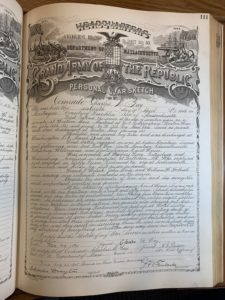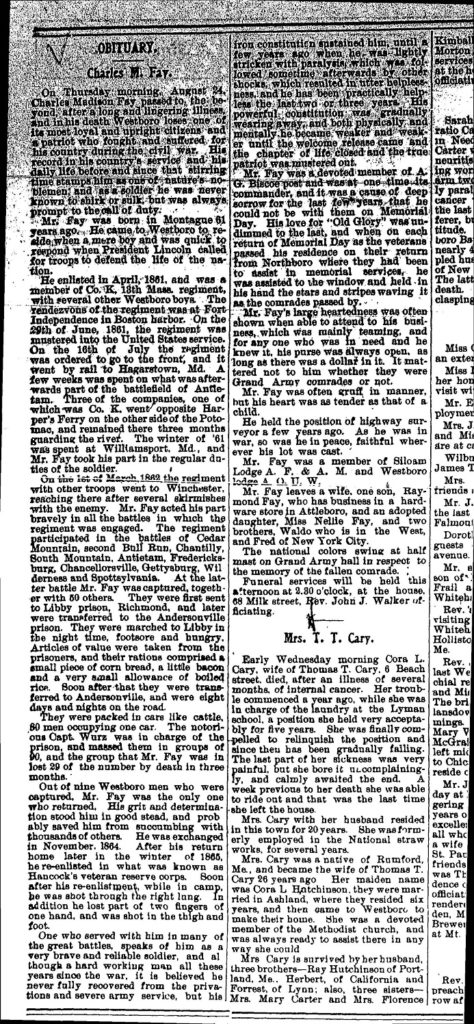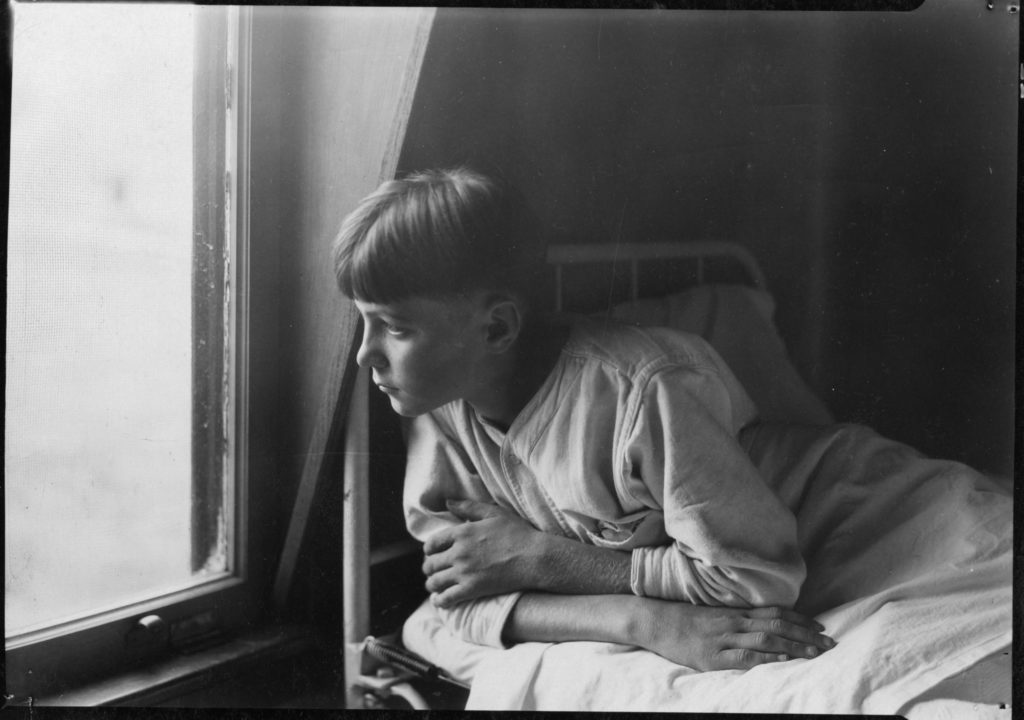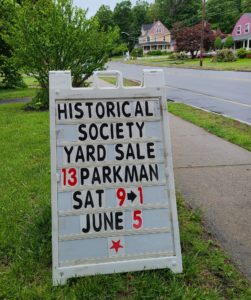
The Discovery of Charles M. Fay
The most exciting element of my job is Discovery. Every time I think that I have unearthed every possible historical record hidden away in our library, another one shows up. Such a discovery happened about two years ago when Cliff Rose, our Library Custodian, found tucked away in the basement of the library a large volume of Personal War Sketches put together in 1890 by the Arthur G. Biscoe Post No. 80 (Westborough) of the Grand Army of the Republic. The volume contains hand-written, first-hand accounts of soldier experiences in the American Civil War. What a gold mine!
In my last Westborough Center Pastimes newsletter, I wrote about the search for Herbert O. Smith, a Westborough soldier who died in the notorious Andersonville Prison in the Civil War. During that search, I made another discovery: Charles M. Fay, who was the only Westborough soldier who spent time in Andersonville and survived. Even more, Fay left an account of his experiences in the Personal War Sketches volume. I couldn’t fit his narrative in the last newsletter, so I am reproducing it in this one. While reading, keep an eye out for Herbert O. Smith, who also makes an appearance in Fay’s personal sketch.
First, some background on Charles M. Fay. He was born April 16, 1844 in Montague, MA in Franklin County. He enlisted to fight in the Civil War in July, 1861 at the age of seventeen and joined the Company K, 13th Reg. Massachusetts Volunteers. He participated in battles at Cedar Mountain, 2nd Bull Run, South Mountain, Chancellorsville, Gettysburg, Wilderness, and Spotsylvania Court House. He was wounded at Harper’s Ferry, Gettysbury, and Harrisburg and was confined in a hospital in Baltimore, MD when he was captured by the Confederacy.
Fay wrote the following account on December 29, 1890.
At the battle of Spotsylvania Court House, I was captured with our Captain and Lieut. and fifty men. I had already nearly served out my term of enlistment, there being less than two months more. As prisoners we were marched almost the entire night following our capture without rations, our guards also sharing our deprivations. Upon reaching Richmond we put up at Hotel Libby where we remained ten days, our bill of fare consisting daily of a small piece of corn bread, bacon and a spoonful of rice boiled. During our stay there we were all searched for valuables and unless one was very expert in secreting them he was sure to find himself stripped of everything which could in any way serve our captors.
At the expiration of the ten days we were started off in search of another boarding place. From Richmond we rode eight days and seven nights, to Andersonville, short of rations all the time. At Charlottesville we were transferred from one road to another causing a delay of two or three hours which were seized upon by such as had aught to purchase with to supply the craving for something to eat. Lieut. Dramwell handed me a $5 bill to buy him provisions with. I succeeded in obtaining some biscuit from a woman, six of which the Lieut. gave me for my trouble. These made one good square meal. Then we were packed into cars, the one I took passage in containing eighty five men. Upon reaching Augusta, we were unloaded and turned into a yard surrounded by sheds, for the night. While there I sold a pair of boots for $45. Confederate money to a “Johnnie” for which I had paid John M. Hill, a Westboro boy $2. I handed a $10. bill through the gate to a boy and requested him to buy me some bread and a little soap. He returned me six pieces of gingerbread and a small bit of soap. Gingerbread $1. each and $4. for soap. Upon reaching Andersonville, the following day, hungry and thirsty, we were introduced to the keeper, Capt. Wirz, who messed us into companies of ninety. Threatened me with a “ball and chain” if I did not “stand up in line.” As we looked over into the stockade and realized in some small degree the suffering and misery before us, our feelings can be better imagined than described. Are we asked to forget? Forgive! we may, but forget! never! From the ninety I was in twenty nine died inside of three months. Have heard it said that “there were rations enough issued for all but that the strong overpowered the weak,” but I deny the assertion. I have often scraped the hot sand to one side to make my bed(?) endurable. The death rate was from 120 to 135 daily, through the summer months. I helped carry out and bury Herbert O. Smith, a Westboro boy, and brought home to his father T. A. Smith letters written by him while in prison together with other mementoes. I messed with Charles Carter, Minot Adams, George Chickering and Irving Walker, all Westboro boys who afterward died in prison at Florence, S.C. Frank Kemp and Walter Ward, also from Westboro, were paroled but both died on the way home. An attempt to portray the amount of suffering and agony our poor boys endured, while in those horrible pens would be futile. For a very commendable and, as far as possible, truthful recital, I most respectfully recommend a perusal of the “Soldier’s Story” by Warren Lee Goss, a member of the 2nd. Mass. Reg. of Heavy Artillery.
Special note: in response to my last newsletter, Leslie Leslie, Curator of Collections at the Westborough Historical Society, posted on Facebook an image and transcription of a letter written by Herbert O. Smith to his father, which, given the account above, was most likely brought back to Westborough by Charles M. Fay after his stay in prison.
Fay died on August 24, 1905 and is buried in Pine Grove Cemetery.
–Anthony Vaver, Local History Librarian

Recommended Reading:
- Warren Lee Goss, A Soldier’s Story of His Captivity at Andersonville, Belle Isle, and Other Rebel Prisons.
- John Anderson, The Fifty-Seventh Regiment of Massachusetts Volunteers in the War of the Rebellion.
- Austin C. Stearns, Three Years with Company K.
* * *
Coming Soon!
We are putting the finishing touches on installing a new exhibit here at the library, just in time for our post-pandemic opening. Within the next couple weeks, “Changing Pictures of Childhood: A Comparative History of Child Welfare in Westborough” will be displayed in the Westborough Center and on the main floor of the library. The exhibit compares two different approaches toward addressing the needs of children facing severe social challenges that were practiced in Westborough at different points in time.
Pauper apprenticeship—where poor children were bound by contract to work as a servant in another family’s home—was commonly used in Massachusetts and other colonies during the colonial period and in the early years of the United States. The exhibit focuses on two children who were indentured as servants in Westborough: Stephen Pratt in 1794 and Patience Miller 1804.
Westborough was also the site of the first publicly financed reform school for boys, which later became known as the Lyman School for Boys. Photographs taken at the school during the years 1905-1912 illustrate the lives of the boys during this time, roughly one hundred years after Pratt and Miller were bound out to local families. By comparing these two approaches towards child welfare, we gain a window into how conceptions of childhood changed historically over this period of time.
* * *
Spring Bazaar and Yard Sale
Treasures galore! The Westborough Historical Society is holding their Spring Bazaar and Yard Sale on Saturday, June 5 from 9 a.m. to 1 p.m.
Stop by the Sibley House at 13 Parkman Street (down from the library) to find and purchase jewelry, toys, housewares, collectibles, china, prints, and more! All proceeds benefit the Westborough Historical Society.
* * *
The Westborough Public Library is revising its strategic plan for 2021-2023. Help us out by taking this short survey and giving us your feedback: http://tinyurl.com/wplsurvey2021.
Your input will help us plan future services, classes and events. The deadline for completion is June 30, 2021
* * *
Did you enjoy reading this Westborough Local History Pastimes newsletter? Then subscribe by e-mail and have the newsletter and other notices from the Westborough Center for History and Culture at the Westborough Public Library delivered directly to your e-mail inbox: https://www.westboroughcenter.org/subscribe-to-updates/.


